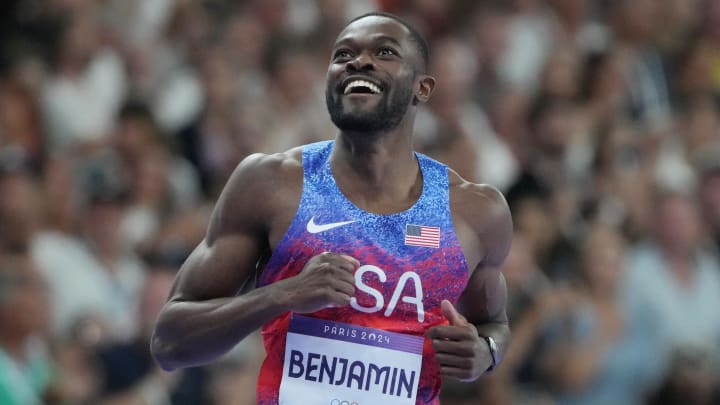Rai Benjamin Brushes Off ‘Mental Games’ to Anchor Team USA to Another 4X400 Win

SAINT-DENIS, France — Rai Benjamin was sitting in the call room before Saturday’s men’s 4X400-meter relay when he heard a joke he didn’t like. He declined to be specific about the line itself or about who said it, but he said it was about Noah Lyles, the American track star who won gold in the 100 meters, then tested positive for COVID-19 and won bronze in the 200 meters a few days later.
“They about to get punished right now,” Benjamin told his teammates.
A few minutes later, the members of the Botswanan team got up and rearranged seats, in what Benjamin took as an attempt to confuse the Americans as to who would run which leg.
“It’s funny how much the mental games are picking up,” he mused afterward, with his second gold medal in two days draped around his neck.
The Americans have now won nine of the past 11 Olympic runnings of this event and 19 overall. (Their dominance here comes in marked contrast to their performance in the 4X100-meter relay, where they can’t seem to get out of their own way. Meanwhile, after winning their third 4X100-meter relay in the last four Olympics, the women won their eighth straight 4X400, this time by a margin that would make Katie Ledecky feel at home.)
Benjamin does not play mental games, he said. He just runs.
Still, he called this “my most calculated anchor leg that I’ve ever run.” Once he realized that Botswana’s Letsile Tebogo, who had won gold in the 200 meters, would face him, Benjamin decided to adjust his race plan.
The U.S. was in first when he got his chance, but by less than a quarter of a second. Botswana’s Bayapo Ndori led the U.S.’s Christopher Bailey through the first leg, and Matthew Hudson-Smith put Great Britain in the lead after the second, relegating the U.S. to third place. But American Bryce Deadmon pulled away in the third leg, leaving Benjamin only a tiny cushion as he faced Tebogo.
“I couldn’t get out too hot, and I couldn't get out too slow, because the kid runs [a 19.4-second 200], and you just don’t play around with people like that that run 19.4,” he said. “So I knew I had to draw him out through 200 and just let him sit on me a little bit.” He added, “I had to be really freaking smart, man. Just run a calculated 200 and just kick like hell coming home and stay patient. I run the 400 hurdles, so I like to think that my engine is bigger than his, but 19.4—we cannot sleep on that.”
Tebogo would indeed put together the fastest 400-meter split of the race, at 43.04, but Benjamin held on to give the U.S. the win by a tenth of a second.
“I think anyone else probably would have just tried to blast it and died coming home,” he said.
The Americans’ 2:54.43 demolished the Olympic record of 2:55.39, set by the U.S. in Beijing, and fell just short of the 2:54.29 world record, set by the U.S. during the 1993 world championships.
The U.S. runners celebrated after the victory, but it was almost businesslike. This is what they were supposed to do. Meanwhile, the Botswanans and the Brits were celebrating the ground they had gained. In Tokyo, the U.S. won by a second and a half, in Rio by nearly a second, in Beijing by more than two and a half seconds.
“This race really shows us that we should keep doing this,” said Tebogo. “Normally, during the Olympics, the United States always has a very big gap to the No. 2. Today, it’s a very big improvement.”
And as for whether they can be topped?
“It’s not just possible,” said Great Britain’s Alex Haydock-Wilson, who ran the first leg. “It’s inevitable at this point.”
They might want to be careful. Benjamin could hear them.
